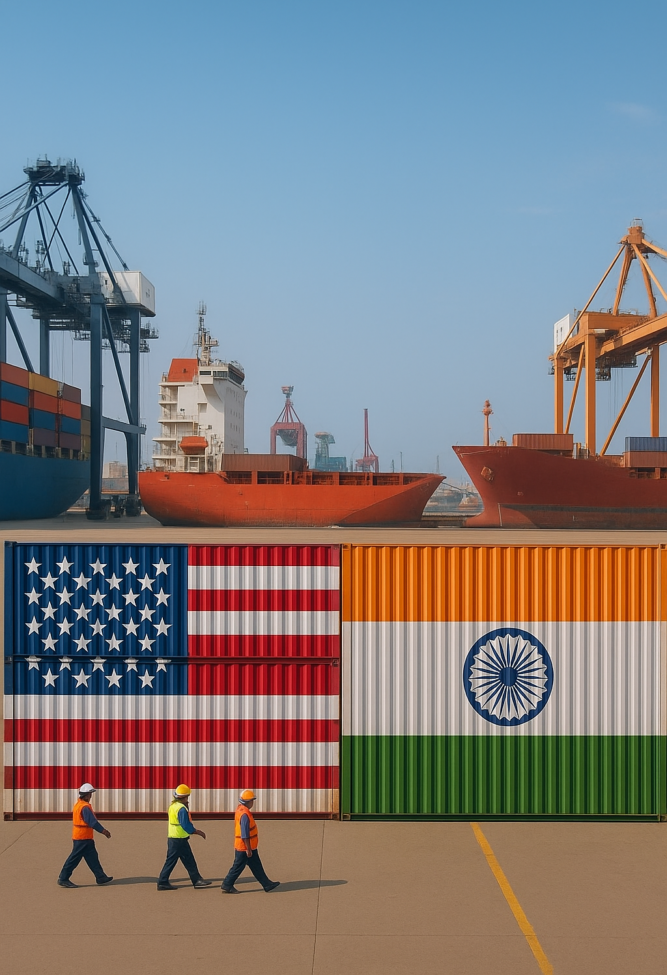Key Facts:
-
India to impose retaliatory tariffs on US products worth $7.6 billion. Response to US safeguard tariffs on steel (25%) and aluminium (10%).
-
Original US tariffs were imposed in March 2018 and revised in 2025.
-
Indian countermeasures to collect $3.82 billion in additional duties.
-
Tariff plan announced during sensitive trade deal negotiations with US.
-
WTO informed by India under Article 8 of the Safeguards Agreement.
-
Initial phase of Indo-US trade deal expected by September-October 2025.
India Plans Retaliatory Tariffs on US Steel, Aluminium Imports
India notifies WTO of proposed tariffs worth $3.82 billion on US goods amidst crucial trade negotiations.
India has taken a decisive step in its ongoing trade standoff with the United States by formally notifying the World Trade Organization (WTO) of its intent to impose retaliatory tariffs on select American imports. The move comes in direct response to US safeguard measures on steel and aluminium, which India claims have significantly impacted its exports.
The Indian government submitted a notification to the WTO on Wednesday, highlighting that it plans to suspend certain trade concessions by introducing additional duties on goods originating from the United States. The retaliation is aimed at countering the continued US imposition of 25% ad valorem tariffs on steel and 10% on aluminium products — originally put into effect on March 23, 2018, and most recently revised on March 12, 2025.
According to India’s submission, these safeguard measures affect US-bound Indian exports valued at approximately $7.6 billion. The counter-tariffs India plans to implement would match the duty collection value of $3.82 billion — effectively seeking to neutralize the impact of the US actions.
“The safeguard measures would affect $7.6 billion in imports into the United States of the relevant products originating in India, on which the duty collection would be $3.82 billion,” India stated in its communication to the WTO.
India’s response comes under the WTO’s Safeguards Agreement, specifically invoking Article 8, which allows affected members to suspend equivalent concessions or obligations if a country imposes safeguard measures without adequate compensation.
This latest escalation arrives at a sensitive time. India and the United States are currently engaged in negotiations aimed at finalizing a comprehensive bilateral trade agreement. The first phase of the deal is expected to reach conclusion by September or October 2025, making India’s action a significant diplomatic signal.
India had already indicated its growing frustration with the US trade stance earlier this month by proposing retaliatory tariffs on American automotive products. The new set of proposed duties will likely include a broader list of goods and is being positioned as a legal and proportionate response under WTO guidelines.
An Economic Times report notes that India’s proposed suspension of concessions will take the form of increased tariffs on specific American products. These countermeasures will be structured to generate tariff revenues equivalent to the losses incurred due to the US safeguards.
While the list of targeted products has not been made public, it is expected to include a range of consumer and industrial goods where the tariff impact can be strategically applied.
India’s action underscores its commitment to defending its trade interests on global platforms while still engaging in dialogue for long-term partnership. Experts believe the move is calculated to pressure Washington into expediting negotiations and reconsidering some of its protectionist policies.
The United States has yet to issue a formal response to India’s notification. However, trade analysts suggest that the imposition of retaliatory tariffs could lead to further consultations under WTO dispute resolution procedures unless the two sides reach a settlement through bilateral talks.
As trade negotiations continue, the latest developments inject fresh uncertainty into the Indo-US economic relationship. Whether these retaliatory measures will prompt a course correction in US policy or further entrench trade barriers remains to be seen. Either way, India has made clear it will assert its rights within the global trade framework.








